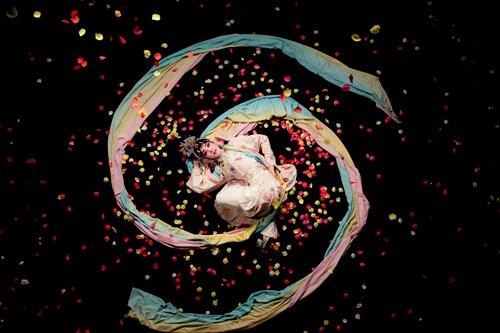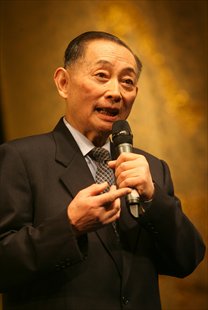Death of Mei Baojiu triggers concern for the future of Peking Opera
Source:Global Times Published: 2016-4-27 20:08:01

Promotional material for Mei Lanfang Classics

Mei Baojiu Photos: IC
Renowned Peking Opera performer, the inheritor of the "Mei Pai" style of performance, passed away on Monday at the age of 82.
The death of such a legendary master has not only been cause for nation-wide mourning, but also triggered concern for the future of this centuries old traditional art form.
Mei Baojiu was the ninth child of Mei Lanfang, one of the most famous Peking Opera performers of all time and creator of the "Mei Pai" vocal style that revolutionized the art.
Inheriting "Mei Pai" from his father, Mei committed himself to spreading the style after his father passed away in 1961, as well as the continual evolution of Peking Opera as a whole.
Peking Opera is a key symbol of Chinese culture. However, its influence is declining, as fewer people are willing to put in the time to learn the demanding art.
Back when Mei Lanfang was still alive, he faced a similar crisis, which drove him towards innovation. Through his efforts, he greatly improved the status of female leading roles in Peking Opera and created many memorable female characters. He also performed in the US in 1930, which brought him fame internationally.
Mei Baojiu began studying Peking Opera at age 10, appeared on stage at 13, and performed together with his father at 18. His entire life was dedicated to Peking Opera.
After taking the baton, the younger Mei continued to keep Peking Opera alive, looking for ways to attract younger audiences to theaters.
Emphasizing the importance of "getting young people to fall in love with Peking Opera," he suggested bringing Peking Opera courses into elementary schools.
As a member of the Chinese People's Political Consultative Conference, he proposed ways to keep Peking Opera dynamic and ensure qualified successors.
In 2014, the 120 anniversary of his father's birth, the then 80-year-old Mei traveled around China organizing workshops and show tours.
With Mei now gone, we are left to wonder who will pick up the torch?
Fortunately other artists and China's Ministry of Culture have been carrying out efforts to keep the art alive and well.
The most recent example is director Tsui Harks' movie adaption of the classic Peking Opera work The Taking of Tiger Mountain, which succeeded both commercially and critically.
Moreover, the Ministry of Culture has announced plans to make classes on Peking Opera part of the curriculum at elementary schools, as well as establish programs for adapting Peking Opera into animated form.
Global Times
Explaining 'Mei Pai'
Created by Mei Lanfang, the Mei Pai school integrated the styles used in the three major types of female roles in Peking Opera and involved many aspects, including singing, dancing and dress. This new style ended up making the name Mei Langfang almost synonymous with female roles.
Representative works: Farewell My Concubine, The Drunken Beauty and Lady General Mu Takes Command.
Peking Opera in the world
Peking Opera originated in China around the 18th century. It's a theater art that combines acrobatics and vocal performances. It is considered one of China's greatest cultural treasures and can be seen in Chinese communities around the world.
For his contributions to art, Peking Opera master Mei Lanfang received honorary degrees from the University of California and Ponoma College.
The University of Hawaii at Monoa has also provided English-language Peking Opera training for decades.
Newspaper headline: The future of tradition
Posted in: Celebrity, Art